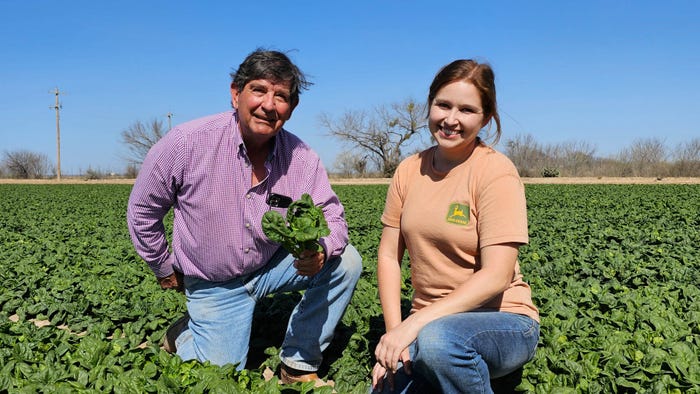
Food recalls and public health alerts make news headlines, but mounting food safety regulations create challenges for spinach producers.
Ed and Paige Ritchie, Zavala County, Texas, go to great lengths to secure a safe food supply for consumers.
Armed with a coding system, the family documents production practices down to the acre.
“If there is a food safety recall, we have to be able to trace back quickly, like within two hours,” said Paige, the farm’s Food Safety Quality Assurance manager. She and her father, Ed, grow spinach and other leafy greens in the fields they call Tiro Tres Farms.

Paige Ritchie, Tiro Tres Farms Food Safety Quality Assurance manager. (Leslie Dominguez, Texas A&M AgriLife Extension)
The increased attention to food safety is important to the family, but it comes at a cost.
Red tape
Tiro Tres Farms grows baby leaf, teen leaf and Savoy spinach in Zavala County, Texas. They are one of three spinach grower/packers in the state.
Historically, the Ritchies primarily had to comply with only USDA food safety regulations, but as consumer demand changed, each customer has also established unique guidelines.
“A lot of these requirements get pushed down from the grocery store to the processing companies like Taylor Farms or Dole, and then to us,” Paige said, adding that Tiro Tres grows and packs the fresh spinach, while other facilities wash and package it.
“Even the fast-food industry,” Ed added. Companies like McDonalds have their own audit scheme.
Tiro Tres Farms conducts multiple audits per year. “We pull a lot of pre-harvest samples and water samples,” Paige said. They also conduct environmental testing to keep up with the required regulations.

Spinach harvest at Tiro Tres Farms. (Leslie Dominguez, Texas A&M AgriLife Extension)
For example, each 5-acre lot has to be tested pre-harvest for E. Coli, salmonella and STEC (shiga toxin-producing escherichia coli). “If it’s not clear, they want us to destroy that lot with a buffer,” Paige said.
When that happens, even if it’s retested and the result is negative, regulations still deem it unharvestable for the fresh spinach market.
When a test is clear, the Ritchies have a limited time within which they can harvest.
“Most customers will only allow seven to 10 days from the test result to harvest that zone or lot. And if you're unable to harvest for some reason, then you have to pull another sample,” Paige said.
Testing is expensive.
“Some customers want per-acre testing,” she added.
The samples are overnighted to a third-party California lab. “It takes a day to get there and a day to return. The timing of that can make it difficult.”
Regulation prompts return home
The Ritchie family has been producing spinach for a century. Paige, who initially returned to the family farm temporarily following her 2014 graduation from Texas A&M University, now manages the farm’s food safety compliance full-time.
“Paige touches everything that requires documentation,” Ed said.

Ed and Paige Ritchie, Tiro Tres Farms, Crystal City, Texas. (Photo by Shelley E. Huguley)
“For the past couple of years, food safety’s been a big learning curve, keeping up with the changing regulations because they’re adding something new every year,” Paige said. “It’s a little more difficult on leafy greens than other crops. Spinach, lettuce and romaine are always in the news for recalls of E. coli, salmonella and listeria. So, that’s difficult.”
Father and daughter admit keeping pace with evolving ordinances is challenging. “When I used to do it, we didn’t have to deal with all this,” Ed said. “Now you worry, did I forget to do something or miss the documentation? It’s stressful.”
Keeping the consumer in mind
Each production decision must be weighed, scrutinizing whether it will leave behind debris or possibly damage the final product.
Crop residue matters. The Ritchies rotate their leafy green fields with grain sorghum and wheat. But they must be careful that the residue, that aids soil health, doesn’t litter their final product. “Anything [sticks and straw] is taboo,” Ed Ritchie said. “We follow our vegetables with grain sorghum and then wheat, which is easier to decompose.” This allows time for sorghum roots and stalks to decay.
Packaging with plastic. The Ritchies transitioned from packing the spinach in wooden bushel baskets to plastic containers. “The consumer didn’t like finding a splinter in the spinach, so now no wood is allowed in the facility other than a pallet,” Paige said.
Livestock adjacent. Crop placement to adjacent fields must also be considered. “The grocery store chains don’t want spinach within a certain mile radius of cattle,” Paige said. “I had an auditor tell me the other day, ‘This doesn’t pass for you. You must be a mile away from the cattle.’ It’s getting difficult to find land we can use because of that rule.”
Read more about:
SpinachAbout the Author(s)
You May Also Like






